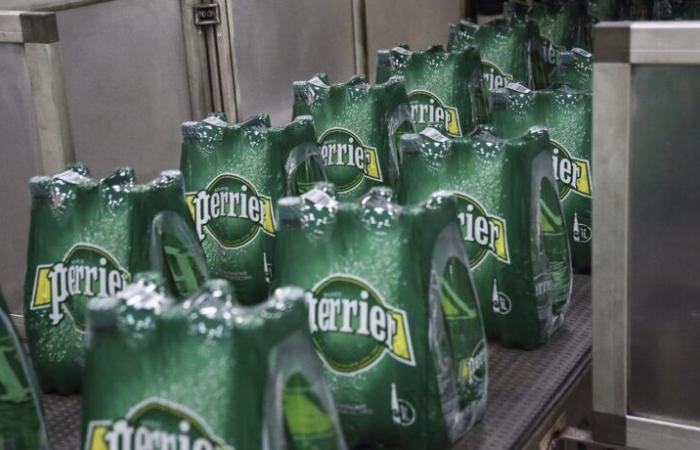
The affair caused a lot of noise. At the end of January 2024, Le Monde and Radio France revealed that a large part of the water sold under the “natural mineral” or “spring” label underwent purification treatments similar to those used for tap water. Several major brands are affected by this illegal practice. Notably Nestlé Waters (Perrier, Vittel, Hépar and Contrex) which concealed from the general public the contamination of the water it drew and used prohibited purification methods while retaining the “natural mineral” label.
Natural mineral water and spring water are distinguished from water made drinkable by treatment by their “original purity”. The first two, drawn from deep groundwater, are supposed to be naturally healthy and can only undergo a very limited number of treatments. The filtration methods used by Nestlé, revealed last January, are therefore prohibited. The group should not have been able to sell its bottles as “natural mineral water”. Which makes Antoinette Guhl, rapporteur of the fact-finding mission, say that it is “an industrial scandal”, coupled with a “political scandal”, because successive governments have allowed too much to happen.
Following these revelations, the senators launched a fact-finding mission to try to understand the failures. They reveal their conclusions this Wednesday, October 16. In developing her mission, Antoinette Guhl deplores the “lack of transparency of certain private and public actors”. But the environmentalist senator from Paris especially remembers the “slowness of Nestlé’s compliance in the absence of more proactive measures from the State”. And more generally, the report highlights two phenomena: “The lack of clarity of the position of the authorities” and the “vulnerability to pollution of groundwater sources”.
Reports from 2020
From 2020, non-compliant water treatment was reported to the authorities by an employee of Sources Alma (Cristalline). An investigation by the National Investigation Service (SNE) of the Directorate General for Competition, Consumer Affairs and Fraud Control (DGCCRF) – which controls the fairness of products – has been launched. It was then extended to other operators and led to a report to the prosecutor in July 2021 for “deception”.
More than a month later, Nestlé Waters admits to using prohibited treatments in certain natural mineral water packaging factories. “They confessed because they knew that their practices would have been discovered,” underlines Antoinette Guhl. The group used activated carbon filters and UV lamp treatments. The company then promises that these treatments have never affected the natural mineral composition of their waters. However, as explained, it is the “original purity” which gives mineral and natural water its name “natural”. “This name is therefore called into question by these treatments which modify the microbiological composition of the water”, indicates the report of the fact-finding mission. State services indicated to the rapporteur, Antoinette Guhl, that “in the absence of reporting, these practices could not have been detected and would undoubtedly have continued”.
A “late and confidential” response from the State
In November 2021, ministers Agnès Pannier-Runacher and Olivier Véran referred the matter to the General Inspectorate of Social Affairs (Igas) for a mission concerning water conditioning plants in France. The results indicate non-compliant practices in almost 30% of cases. Igas still considers this rate underestimated given the difficulties of identifying practices and the declarative nature of the responses. The fact-finding mission deplores “that no immediate follow-up measures have been taken to avoid the placing on the market of natural mineral water that does not meet the conditions required to be marketed”. But also that the State’s response, by simply having seized Igas, was “late and confidential”.
The Igas report is also concerned about the development of microfiltration, widely used by Nestlé. It is a physical process for separating a finely divided phase from a liquid phase, using a membrane. 85% of manufacturers have used this technique. If no European harmonization exists in this area, the cut-off threshold of 0.8 microns is considered acceptable by the authorities. However, the Igas mission highlights the “generalization of cut-off thresholds of 0.45 microns”. The Ministry of Health has recommended to Regional Health Agencies (ARS) the maintenance of microfiltration below 0.8 microns provided that the operator provides proof that this treatment does not modify the microbiism of the water. The fact-finding mission report denounces “an increase in administrative tolerance with regard to microfiltration”. It recommends the adoption of a “clear and general position of the authorities on the acceptable microfiltration threshold within the framework of a European dialogue”.
Nestlé’s transformation plan
Throughout 2023, a transformation plan is presented by Nestlé Waters to the political authorities under the aegis of state services. It is based on the removal of disinfection treatments in return for the use of microfiltration down to 0.2 microns. These requests take effect in particular in the Vosges and Gard. The rapporteur underlines “the slowness of the cessation of practices explicitly prohibited by the regulations”. Antoinette Guhl, environmentalist senator from Paris continues: “In the Vosges, they stopped almost a year and a half after the revelations of Nestlé Waters to the State and in the Gard, it is two years later”.
In April 2023, the Directorate General of Health (DGS) sets up “reinforced surveillance” of areas operated by Nestlé Waters in the Vosges. The same control is then implemented in Gard. The fact-finding mission notes that this “reinforced surveillance has not made it possible to remove doubts as to compliance in all circumstances with the criteria of ‘original purity of resources’”. Faced with “persistent doubts”, Antoinette Guhl recommends continuing and extending reinforced surveillance, particularly in places that are still little monitored today.
“Poor collaboration between the competent authorities”
There is “poor collaboration between and within competent authorities, both centrally and locally,” concludes a European Commission audit report. To cite a few examples, the General Directorate for Competition, Consumer Affairs and Fraud Control (DGCCRF) was not aware of the Igas report before its publication in February 2024, even though the latter indicates that it was presented to the three ministries in July 2022. For its part, ANSES – which plays a central role in the technical assessment of the practices concerned – demonstrates a lack of information throughout the sequence. The report therefore recommends “considerably developing networking between the competent authorities for the control of natural mineral waters and spring waters”.
The fact-finding mission also points to a lack of “transparency in the industrial relations with public authorities”. As in August 2021, despite the problems raised, Nestlé Waters has not contacted the Minister of Health even though he has broad authority on the subject. The mission also mentions “sometimes fragmentary communication”. For example, Nestlé indicated to the media in April 2024 that it had destroyed two million bottles of the Perrier brand as a precaution. These facts were later overturned. The request had in fact been made by the prefect of Gard on a proposal from the Regional Health Agency. And nearly three million bottles were destroyed.
“Publicity measures” in the event of non-compliance
To avoid any hindrance in controls, Senator Antoinette Guhl recommends “perpetuating unannounced inspections”. It reaffirms “the obligation for operators to allow inspection agents to immediately enter the site” when an inspection is carried out. The elected environmentalist continues by recommending “corrective measures” accompanied by “publicity measures” in the event of non-compliance to bring the problem to the attention of the consumer.
The report also questions practices that attack “the sustainability and quality of natural mineral water resources”. In particular excessive withdrawals, the artificialization of soils or the emission of pollutants from human activities. Climate change appears to be an “aggravating factor” in the vulnerability of sources. To have better information on the sustainability and vulnerability of the resource, the rapporteur recommends launching “a study campaign of the hydrosystems exploited by manufacturers”, to “make public the quantities of water taken by the operators” , but also “to update the action plan on micropollutants by including packaged water in order to have complete information on their level of pollution”.





